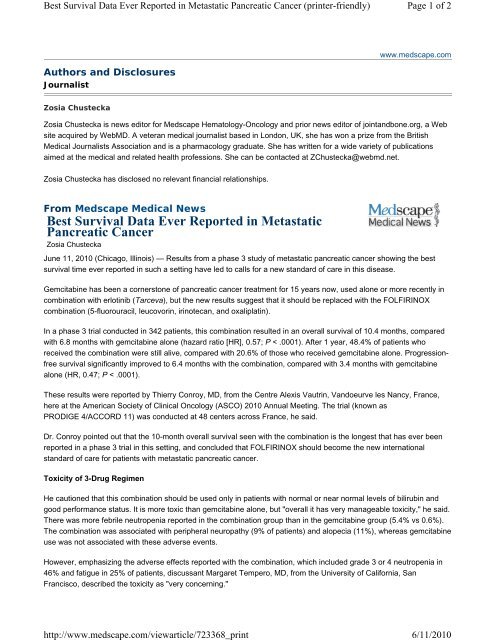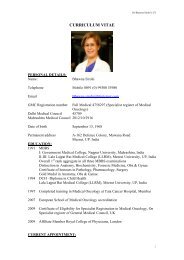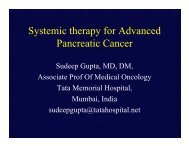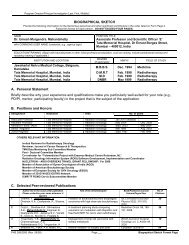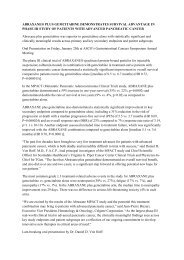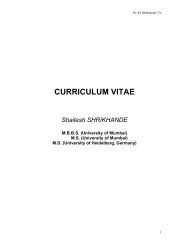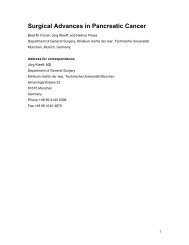Journalist - Pancreatic Cancer India
Journalist - Pancreatic Cancer India
Journalist - Pancreatic Cancer India
Create successful ePaper yourself
Turn your PDF publications into a flip-book with our unique Google optimized e-Paper software.
Best Survival Data Ever Reported in Metastatic <strong>Pancreatic</strong> <strong>Cancer</strong> (printer-friendly)<br />
http://www.medscape.com/viewarticle/723368_print<br />
Page 1 of 2<br />
6/11/2010<br />
www.medscape.com<br />
Authors and Disclosures<br />
<strong>Journalist</strong><br />
Zosia Chustecka<br />
Zosia Chustecka is news editor for Medscape Hematology-Oncology and prior news editor of jointandbone.org, a Web<br />
site acquired by WebMD. A veteran medical journalist based in London, UK, she has won a prize from the British<br />
Medical <strong>Journalist</strong>s Association and is a pharmacology graduate. She has written for a wide variety of publications<br />
aimed at the medical and related health professions. She can be contacted at ZChustecka@webmd.net.<br />
Zosia Chustecka has disclosed no relevant financial relationships.<br />
From Medscape Medical News<br />
Best Survival Data Ever Reported in Metastatic<br />
<strong>Pancreatic</strong> <strong>Cancer</strong><br />
Zosia Chustecka<br />
June 11, 2010 (Chicago, Illinois) — Results from a phase 3 study of metastatic pancreatic cancer showing the best<br />
survival time ever reported in such a setting have led to calls for a new standard of care in this disease.<br />
Gemcitabine has been a cornerstone of pancreatic cancer treatment for 15 years now, used alone or more recently in<br />
combination with erlotinib (Tarceva), but the new results suggest that it should be replaced with the FOLFIRINOX<br />
combination (5-fluorouracil, leucovorin, irinotecan, and oxaliplatin).<br />
In a phase 3 trial conducted in 342 patients, this combination resulted in an overall survival of 10.4 months, compared<br />
with 6.8 months with gemcitabine alone (hazard ratio [HR], 0.57; P < .0001). After 1 year, 48.4% of patients who<br />
received the combination were still alive, compared with 20.6% of those who received gemcitabine alone. Progressionfree<br />
survival significantly improved to 6.4 months with the combination, compared with 3.4 months with gemcitabine<br />
alone (HR, 0.47; P < .0001).<br />
These results were reported by Thierry Conroy, MD, from the Centre Alexis Vautrin, Vandoeurve les Nancy, France,<br />
here at the American Society of Clinical Oncology (ASCO) 2010 Annual Meeting. The trial (known as<br />
PRODIGE 4/ACCORD 11) was conducted at 48 centers across France, he said.<br />
Dr. Conroy pointed out that the 10-month overall survival seen with the combination is the longest that has ever been<br />
reported in a phase 3 trial in this setting, and concluded that FOLFIRINOX should become the new international<br />
standard of care for patients with metastatic pancreatic cancer.<br />
Toxicity of 3-Drug Regimen<br />
He cautioned that this combination should be used only in patients with normal or near normal levels of bilirubin and<br />
good performance status. It is more toxic than gemcitabine alone, but "overall it has very manageable toxicity," he said.<br />
There was more febrile neutropenia reported in the combination group than in the gemcitabine group (5.4% vs 0.6%).<br />
The combination was associated with peripheral neuropathy (9% of patients) and alopecia (11%), whereas gemcitabine<br />
use was not associated with these adverse events.<br />
However, emphasizing the adverse effects reported with the combination, which included grade 3 or 4 neutropenia in<br />
46% and fatigue in 25% of patients, discussant Margaret Tempero, MD, from the University of California, San<br />
Francisco, described the toxicity as "very concerning."
Best Survival Data Ever Reported in Metastatic <strong>Pancreatic</strong> <strong>Cancer</strong> (printer-friendly)<br />
http://www.medscape.com/viewarticle/723368_print<br />
Page 2 of 2<br />
6/11/2010<br />
"I am not sure" that FOLFIRINOX should become the new international standard of care for metastatic pancreatic<br />
cancer, she said, and cautioned that "enthusiasm must be tempered by its attendant side effects." Patients receiving<br />
this regimen will need access to good supportive care and a capable biliary team, she added.<br />
Nevertheless, Dr. Tempero said this was "ground-breaking work," and added that this approach should now be<br />
advanced to "the adjuvant setting, where we can accept a regimen with more toxicity."<br />
Also unsure about whether this combination would become a worldwide standard of care was Charles Blanke, MD,<br />
from the University of British Columbia in Vancouver, who chose this study as one of the highlights or the day. He said<br />
the study was "very well conducted," but expects that the medical community will want confirmation from a North<br />
American trial.<br />
"This trial has got us all talking," said John Marshall, MD, director of clinical research at the Lombardi Comprehensive<br />
<strong>Cancer</strong> Center, Georgetown University, Washington, DC, in a video review of ASCO gastrointestinal cancer news for<br />
Medscape Oncology. He said it looks as if, after 15 years, gemcitabine might be replaced as the standard of care, but<br />
he did wonder if all 3 drugs in the FOLFIRINOX regimen were necessary, and whether 2 drugs would work just as well.<br />
The trial was supported by Amgen and grants from the French government and the French league against cancer. Dr.<br />
Conroy and colleagues have disclosed no relevant financial relationships. Dr. Marshall reports serving as a<br />
consultant/advisor or speaker and receiving research grants and remuneration from Amgen, Genentech, and Roche.<br />
American Society of Clinical Oncology (ASCO) 2010 Annual Meeting: Abstract 4010. Presented June 7, 2010.<br />
Medscape Medical News © 2010 Medscape, LLC<br />
Send press releases and comments to news@medscape.net.


